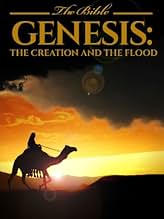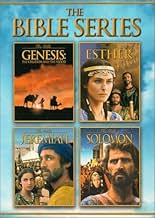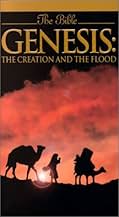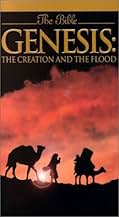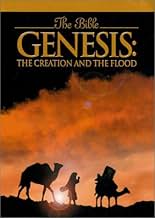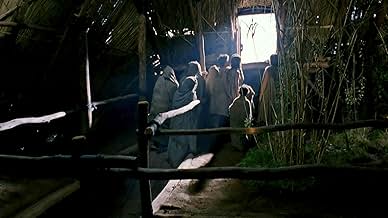NOTE IMDb
5,5/10
830
MA NOTE
C'est d'abord à travers le regard d'un enfant que nous découvrons la merveille de la Création. La nature, la vie, le monde en son premier jour. Puis, viendront Adam et Eve, Cain et Abel, Noé... Tout lireC'est d'abord à travers le regard d'un enfant que nous découvrons la merveille de la Création. La nature, la vie, le monde en son premier jour. Puis, viendront Adam et Eve, Cain et Abel, Noé et le Déluge.C'est d'abord à travers le regard d'un enfant que nous découvrons la merveille de la Création. La nature, la vie, le monde en son premier jour. Puis, viendront Adam et Eve, Cain et Abel, Noé et le Déluge.
- Réalisation
- Scénario
- Casting principal
- Récompenses
- 1 nomination au total
Paul Scofield
- Narrator
- (English version)
- (voix)
Avis à la une
Am ambitious adaptation of the first book of the Bible, taking us up to the time of Noah, GENESIS: THE CREATION AND THE FLOOD is a film that's beautiful to watch. The film was shot in Morocco employing a cast of mostly locals, and it looks absolutely stunning: if you ever wanted to see a film that displays the inherent beauty of nature, then this is the one. It took my breath away in places.
As a Biblical adaptation, it has its work cut out. GENESIS lacks a single leading character so this film adopts a voice over (by Paul Scofield) to intone much of the story involving Adam and Eve, Cain and Abel, and Noah. It's all simple and straightforward, with admittedly powerful scenes (inserting modern-day conflict into one section is a genius idea) but it's also very slow and long-winded despite a running time of only an hour and a half.
The lack of a decent budget is also apparent - we never really see the flood despite the lengthy section telling Noah's story - but that doesn't really matter given the calibre of Ermanno Olmi's direction. This is a worthy adaptation, but not really a film you'd want to go back to.
As a Biblical adaptation, it has its work cut out. GENESIS lacks a single leading character so this film adopts a voice over (by Paul Scofield) to intone much of the story involving Adam and Eve, Cain and Abel, and Noah. It's all simple and straightforward, with admittedly powerful scenes (inserting modern-day conflict into one section is a genius idea) but it's also very slow and long-winded despite a running time of only an hour and a half.
The lack of a decent budget is also apparent - we never really see the flood despite the lengthy section telling Noah's story - but that doesn't really matter given the calibre of Ermanno Olmi's direction. This is a worthy adaptation, but not really a film you'd want to go back to.
This is a magnificent movie. It clearly achieves the effect that the filmmakers intended.
It's a gorgeous meditation on the biblical story and the religious awe that inspired the book. It's an unusual film—a good thing, because it doesn't really follow any sort of formula. Instead, it builds up interest through the rather straightforward telling of the dawn of man, and it summons that spiritual part of us that can look at the flight of birds, hear the sound of rain, and listen to music, whereby we are transported to a higher realm than the one in which we live.
Many natural phenomena are used in this audio/video symphony. The look of wisdom and dignity on an old man's face and the words he speaks with such controlled mastery blend together and augment the constituent parts of the world as described by him, and causes us not to consider the science behind what's happening, but its grandeur. The scientist Richard Dawkins is a nice man. I like him. But it is at times like this, when I'm immersed in the spiritual rather than the scientific, that I genuinely feel sorry for him. It's wonderful to be able to appreciate the "science and reason" portion of our nature without discarding the spiritual part of it.
We humans are complex animals, and our thoughts and appetites run the gamut from the basest carnality to the most supremely ethereal. The two types of impulses are inherent to most of us—we are born with them: they are what make us fully human. Completely stifling either one seems just as unnatural as letting either run rampant.
That is the remarkable achievement contained within this film: the incredible control and dexterity, the decisions of the director over what to place in the film and what to leave out of it. There is the aspect of a symphony going on here. The images of primitive human conditions that combine in the mind and allows us to make that leap from the ordinary to the extraordinary—the same state of mind that allows us to hear a Beethoven composition and hear the sublimity without considering the natural world particulars of what frequency the notes are played at and the laws of physics behind tonality.
There really isn't a false step in the film. There are no sour notes, and nothing is out of key. Whoever had the ultimate decision-making power of what went into and what didn't make the cut in this film was someone cut from the same cloth as our ancestor who conceived of "In the beginning, the earth was without. . ." If anyone can identify with God it really shouldn't be doctors; instead it's really writers and especially filmmakers, the people who build worlds. Those who let light impose an image on celluloid and out of the darkness of the darkroom come forth a new world, limited only by their imagination and finesse. The Bible does say that we are made in the image of God, and as far as that goes, the director of this movie did a pretty good job of living up to that standard.
The film follows a nomadic family – a very nice one – at the dawn of man. Everyone should have a grandfather who is as good a storyteller as this man. The conditions are primitive but life is good for them, for this is a happy (and believable) family. There isn't much dialog between the characters, a good thing, because the intention of the filmmakers is to make a visual and aural experience; one in which they succeeded at beautifully.
Well, watch the movie yourself. If you understand where the people who made the movie are coming from you can judge the movie's merits based entirely upon that criteria. That's what I've done, and that's why I've given it ten out of ten stars.
For the purposes of enjoying this movie, don't worry about whether or not it's the God's honest truth. It doesn't have to be true. All you need in order to enjoy the film is to do what you do in any movie you watch—suspend your disbelief for the duration of the film. Kick back and enjoy a wonderfully uplifting experience.
It's a gorgeous meditation on the biblical story and the religious awe that inspired the book. It's an unusual film—a good thing, because it doesn't really follow any sort of formula. Instead, it builds up interest through the rather straightforward telling of the dawn of man, and it summons that spiritual part of us that can look at the flight of birds, hear the sound of rain, and listen to music, whereby we are transported to a higher realm than the one in which we live.
Many natural phenomena are used in this audio/video symphony. The look of wisdom and dignity on an old man's face and the words he speaks with such controlled mastery blend together and augment the constituent parts of the world as described by him, and causes us not to consider the science behind what's happening, but its grandeur. The scientist Richard Dawkins is a nice man. I like him. But it is at times like this, when I'm immersed in the spiritual rather than the scientific, that I genuinely feel sorry for him. It's wonderful to be able to appreciate the "science and reason" portion of our nature without discarding the spiritual part of it.
We humans are complex animals, and our thoughts and appetites run the gamut from the basest carnality to the most supremely ethereal. The two types of impulses are inherent to most of us—we are born with them: they are what make us fully human. Completely stifling either one seems just as unnatural as letting either run rampant.
That is the remarkable achievement contained within this film: the incredible control and dexterity, the decisions of the director over what to place in the film and what to leave out of it. There is the aspect of a symphony going on here. The images of primitive human conditions that combine in the mind and allows us to make that leap from the ordinary to the extraordinary—the same state of mind that allows us to hear a Beethoven composition and hear the sublimity without considering the natural world particulars of what frequency the notes are played at and the laws of physics behind tonality.
There really isn't a false step in the film. There are no sour notes, and nothing is out of key. Whoever had the ultimate decision-making power of what went into and what didn't make the cut in this film was someone cut from the same cloth as our ancestor who conceived of "In the beginning, the earth was without. . ." If anyone can identify with God it really shouldn't be doctors; instead it's really writers and especially filmmakers, the people who build worlds. Those who let light impose an image on celluloid and out of the darkness of the darkroom come forth a new world, limited only by their imagination and finesse. The Bible does say that we are made in the image of God, and as far as that goes, the director of this movie did a pretty good job of living up to that standard.
The film follows a nomadic family – a very nice one – at the dawn of man. Everyone should have a grandfather who is as good a storyteller as this man. The conditions are primitive but life is good for them, for this is a happy (and believable) family. There isn't much dialog between the characters, a good thing, because the intention of the filmmakers is to make a visual and aural experience; one in which they succeeded at beautifully.
Well, watch the movie yourself. If you understand where the people who made the movie are coming from you can judge the movie's merits based entirely upon that criteria. That's what I've done, and that's why I've given it ten out of ten stars.
For the purposes of enjoying this movie, don't worry about whether or not it's the God's honest truth. It doesn't have to be true. All you need in order to enjoy the film is to do what you do in any movie you watch—suspend your disbelief for the duration of the film. Kick back and enjoy a wonderfully uplifting experience.
My father rented "The Bible Collection" DVDs over the Easter period, but I was interested in watching only two of these and that was only because of who directed them - this one by Italian film-maker Olmi and the already-reviewed SAMSON AND DELILAH (1996) by Nicolas Roeg.
Of course, as Roeg's film obviously elicited largely unfavorable comparisons to Cecil B. De Mille's 1949 spectacular, so too does this one to John Huston's notorious 1966 biblical flop. Still, much as that film proved a disappointment, its undeniable grandeur is vastly preferable to the ordinariness and quasi-documentary style of Olmi's effort (the star cast Huston assembled certainly didn't hurt - whereas here only Italian actor Omero Antonutti is recognizable at all, as the rest of the cast is comprised of non-professional Moroccans)!
To be fair to Olmi, he handles the events with some imagination - as they're presented in the form of campfire tales narrated by nomad Antonutti (who also takes on the role of Noah) to his people - and the images (accentuated by Ennio Morricone's wistful score) are often poetic...but the over-familiarity of it all and the distinct lack of excitement displayed throughout results in sheer dullness! Thankfully, the film is only around an hour and a half in length - whereas most of the other titles in "The Bible Collection" ran for something like twice that running-time (as does, after all, John Huston's THE BIBLE - IN THE BEGINNING itself). One other asset to the film, at least in its English-dubbed version I watched, is the melodious voice of Paul Scofield (who dubs Antonutti throughout).
Of course, as Roeg's film obviously elicited largely unfavorable comparisons to Cecil B. De Mille's 1949 spectacular, so too does this one to John Huston's notorious 1966 biblical flop. Still, much as that film proved a disappointment, its undeniable grandeur is vastly preferable to the ordinariness and quasi-documentary style of Olmi's effort (the star cast Huston assembled certainly didn't hurt - whereas here only Italian actor Omero Antonutti is recognizable at all, as the rest of the cast is comprised of non-professional Moroccans)!
To be fair to Olmi, he handles the events with some imagination - as they're presented in the form of campfire tales narrated by nomad Antonutti (who also takes on the role of Noah) to his people - and the images (accentuated by Ennio Morricone's wistful score) are often poetic...but the over-familiarity of it all and the distinct lack of excitement displayed throughout results in sheer dullness! Thankfully, the film is only around an hour and a half in length - whereas most of the other titles in "The Bible Collection" ran for something like twice that running-time (as does, after all, John Huston's THE BIBLE - IN THE BEGINNING itself). One other asset to the film, at least in its English-dubbed version I watched, is the melodious voice of Paul Scofield (who dubs Antonutti throughout).
I was very moved by the images in this lyric evocation of the Book of Genesis by the great Italian director Ermanno Olmi, whose TREE OF WOODEN CLOGS is one of my favorite films of all time.
Through a series of painterly images, and the calming, soothing narration of Omero Antonutti (Paul Scofield in the English version,) we are hand-led from the creation of man (in simple, elemental, but effective brush-strokes) to the fall of man, to what constitutes the longest segment of the film, Noah's construction of the ark, and the first of mankind's redemptions. Omero Antonutti plays the old man, the prophet-vessel of God himself as his boat is the vessel of a new humanity. The loading of the animals, the sense among Noah's extended family during the voyage that they are part of something greater than themselves, the dove at Ararat with the olive branch in its mouth, the vista of a subsiding ocean, all create, with the simplest of means, an impression that can be sublimely moving. And we ask ourselves why. What special gift can make a film director convert images, words, and sounds into the sacramental?
The music and musical selections by Ennio Morricone (with a great deal of Bulgarian women's chants incorporated) create a haunting impression as well. One does not have to be a great believer or even a believer at all, to be swayed by this work of wondrous poetry.
Through a series of painterly images, and the calming, soothing narration of Omero Antonutti (Paul Scofield in the English version,) we are hand-led from the creation of man (in simple, elemental, but effective brush-strokes) to the fall of man, to what constitutes the longest segment of the film, Noah's construction of the ark, and the first of mankind's redemptions. Omero Antonutti plays the old man, the prophet-vessel of God himself as his boat is the vessel of a new humanity. The loading of the animals, the sense among Noah's extended family during the voyage that they are part of something greater than themselves, the dove at Ararat with the olive branch in its mouth, the vista of a subsiding ocean, all create, with the simplest of means, an impression that can be sublimely moving. And we ask ourselves why. What special gift can make a film director convert images, words, and sounds into the sacramental?
The music and musical selections by Ennio Morricone (with a great deal of Bulgarian women's chants incorporated) create a haunting impression as well. One does not have to be a great believer or even a believer at all, to be swayed by this work of wondrous poetry.
It would have been nice to see a little more accuracy. There were only 8 people in Noah's ark, including Noah, his wife, their sons and their wives. (See 1 Peter 3:20). I did like the authenticity of the landscape and culture, but it was somewhat boring without much emotion from the actors.
Le saviez-vous
- AnecdotesThe film had its world premiere on September 6, 1994, out of competition at the Venice Film Festival.
- ConnexionsFollowed by Jacob (1994)
Meilleurs choix
Connectez-vous pour évaluer et suivre la liste de favoris afin de recevoir des recommandations personnalisées
- How long is Genesis: The Creation and the Flood?Alimenté par Alexa
Détails
- Date de sortie
- Pays d’origine
- Langues
- Aussi connu sous le nom de
- Genesis: The Creation and the Flood
- Lieux de tournage
- Sociétés de production
- Voir plus de crédits d'entreprise sur IMDbPro
Contribuer à cette page
Suggérer une modification ou ajouter du contenu manquant


